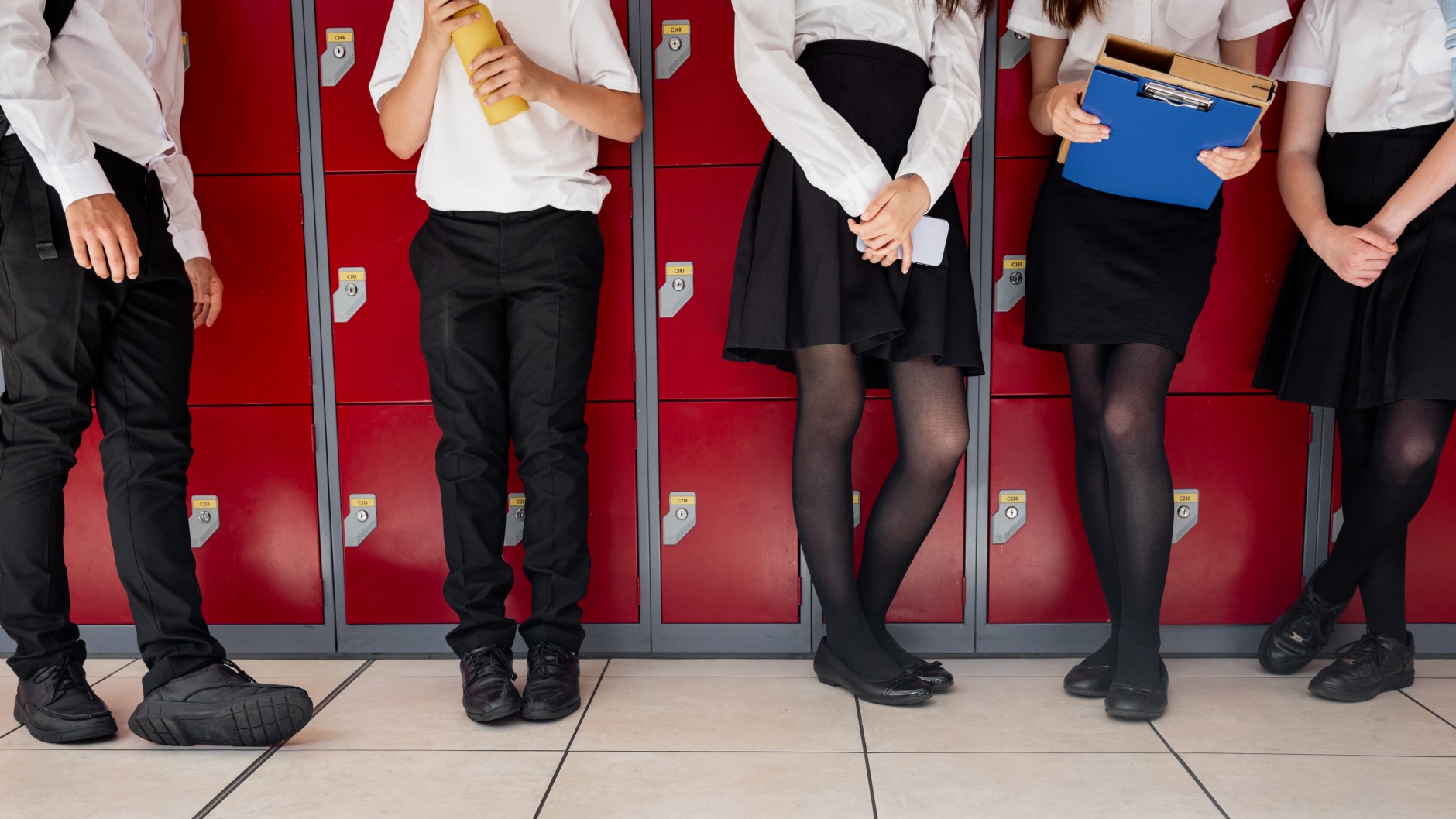Pros and cons of school uniform
Government plans to ease costs for parents with new rules on branded uniform

A free daily email with the biggest news stories of the day – and the best features from TheWeek.com
You are now subscribed
Your newsletter sign-up was successful
The start of a new school term invariably revives the age-old debate about the pros and cons of school uniforms among students, parents and teachers alike.
This week also sees MPs debate the Children's Wellbeing and Schools Bill, which Labour hopes will go some way to easing the financial burden on parents by fulfilling its manifesto pledge to "bring down the cost of school by limiting the number of branded items of uniform and PE kit that schools can require".
With nearly a third of parents struggling to afford uniforms but the majority of teachers adamant they are essential to creating a level playing field, these are the main arguments for and against.
The Week
Escape your echo chamber. Get the facts behind the news, plus analysis from multiple perspectives.

Sign up for The Week's Free Newsletters
From our morning news briefing to a weekly Good News Newsletter, get the best of The Week delivered directly to your inbox.
From our morning news briefing to a weekly Good News Newsletter, get the best of The Week delivered directly to your inbox.
Pro: promotes equality and inclusion
The most oft-cited value of school uniform is that, "if it is implemented sensibly, it can have a useful equalising effect in the classroom", said Stephen Bush at the Financial Times. "It can be a way to ensure that, however briefly, no child is easily marked out from another due to their inability to afford the latest fashions or a popular item of clothing."
Four out of five teachers believe school uniforms are vital to creating a level playing field, according to a survey by the Schoolwear Association, cited by The Guardian.
The association said uniforms foster "a sense of community, equality, discipline and professionalism", echoing a 2007 survey from Oxford Brookes University that found uniforms often "directly contributed to a feeling of school pride".
Con: imposes extra financial burden
Uniform is expensive: 78% of parents spend more than £100 every school year, according to a survey commissioned by Wynsors last summer. Over half of these respondents (57%) are forking out up to £249. "With the cost-of-living crisis already causing financial issues for many families, it's understandable why British parents are feeling the pressure of having to pay alarming amounts for school kit," said a blog on the shoe retailer's site.
A free daily email with the biggest news stories of the day – and the best features from TheWeek.com
Parents are "routinely paying more than double the price for branded school uniforms, compared with similar items offered by supermarkets and high-street stores", found analysis by The Observer.
In a bid to alleviate some of this financial burden, the new Children's Wellbeing and Schools Bill will impose a limit of three branded items of school uniform required by primary schools, and four items by secondary schools, if a tie is branded. Set to come into effect in September 2026, "this includes PE kit and applies to after-school activities" but still allows schools to offer "optional" branded uniform items, said Schools Week.
Pro: promotes discipline and focus
Uniforms became more common in the US in the late 1980s "with the promise that they would curb gang violence and crime", said The Washington Post. Uniforms, teachers say, "have become a no-nonsense way to stave off distractions" and focus on learning.
This argument is a variation on the "broken windows" theory of law and order, said Will Hazell for The i Paper: "if schools clamp down on sloppy dress and incorrect clothing, it makes clear to pupils that the teachers are in charge".
While there is little empirical evidence to back this up, the rationale has nevertheless been used as part of a pilot programme in France to establish if uniforms can improve behaviour. If successful the French government has said the scheme could be rolled out nationwide.
Con: curbs freedom of expression
The claim that school uniforms restrict personal expression is the "most frequently used defence against them", said Fashion Law Journal. "Kids and teenagers express themselves and identify with particular social groupings through their clothing choices" and so "many students who oppose school uniforms claim that, when they are denied the freedom to express themselves through clothing, they lose their sense of self".
The growing support for school uniforms in the US is "one of the great surrenderings of liberty in modern history", said Mark Oppenheimer in The New Yorker. Uniforms are "yet one more way that the surveillance of the un-powerful – the poor, people of colour, and that great unheard group of the young – has become increasingly acceptable".
In August, the UK Competition and Markets Authority urged schools to think about whether their policies on uniform are actually in the "best interest of pupils and parents".
Pro: could save time and money overall
Conversely, uniforms can also "save students and parents time and money", said the School Wear United blog.
"Instead of spending time each morning trying to decide what to wear, students can simply put on their uniforms and be ready for school. Additionally, uniforms can be less expensive than trendy clothing, and they can often be purchased in bulk or handed down from older siblings."
Put bluntly, when there is a uniform policy, "there is no peer pressure on students to have the latest trainers", Dame Rachel De Souza, the Children's Commissioner for England, told The i Paper.
Con: continued gender issues
A 2018 survey from Plan International UK found that a third of British girls said they were sexually harassed while in their school uniforms. Of course, there is no real evidence that they would have been any safer out of school uniform.
There is also the widely held view that schools police female students' uniform to a greater extent than they do with boys, particularly with regards to modesty rules.
"If we're going to have school uniforms, it should be the same for every child with no differing options," said one mother in Metro. "Then if boys and girls all wear trousers, we don't need arguments about skirt lengths or about which uniform non-binary or transgender children should wear."
Harriet Marsden is a senior staff writer and podcast panellist for The Week, covering world news and writing the weekly Global Digest newsletter. Before joining the site in 2023, she was a freelance journalist for seven years, working for The Guardian, The Times and The Independent among others, and regularly appearing on radio shows. In 2021, she was awarded the “journalist-at-large” fellowship by the Local Trust charity, and spent a year travelling independently to some of England’s most deprived areas to write about community activism. She has a master’s in international journalism from City University, and has also worked in Bolivia, Colombia and Spain.
-
 ‘Poor time management isn’t just an inconvenience’
‘Poor time management isn’t just an inconvenience’Instant Opinion Opinion, comment and editorials of the day
-
 Bad Bunny’s Super Bowl: A win for unity
Bad Bunny’s Super Bowl: A win for unityFeature The global superstar's halftime show was a celebration for everyone to enjoy
-
 Book reviews: ‘Bonfire of the Murdochs’ and ‘The Typewriter and the Guillotine’
Book reviews: ‘Bonfire of the Murdochs’ and ‘The Typewriter and the Guillotine’Feature New insights into the Murdoch family’s turmoil and a renowned journalist’s time in pre-World War II Paris
-
 England’s ‘dysfunctional’ children’s care system
England’s ‘dysfunctional’ children’s care systemIn the Spotlight A new report reveals that protection of youngsters in care in England is failing in a profit-chasing sector
-
 The pros and cons of banning cellphones in classrooms
The pros and cons of banning cellphones in classroomsPros and cons The devices could be major distractions
-
 School phone bans: Why they're spreading
School phone bans: Why they're spreadingFeature 17 states are imposing all-day phone bans in schools
-
 Schools: The return of a dreaded fitness test
Schools: The return of a dreaded fitness testFeature Donald Trump is bringing the Presidential Fitness Test back to classrooms nationwide
-
 Send reforms: government's battle over special educational needs
Send reforms: government's battle over special educational needsThe Explainer Current system in 'crisis' but parents fear overhaul will leave many young people behind
-
 Education: Can public schools be religious?
Education: Can public schools be religious?Feature A Supreme Court seems ready to rule in favor of religious charter schools in Oklahoma, which could reshape public education
-
 America's academic brain drain has begun
America's academic brain drain has begunIN THE SPOTLIGHT As the Trump administration targets universities and teachers, educators are eying greener academic pastures elsewhere — and other nations are starting to take notice
-
 Schools' Send crisis: how can it be fixed?
Schools' Send crisis: how can it be fixed?Today's Big Question Government urged to reform support for children with special educational needs and disabilities and save councils from bankruptcy